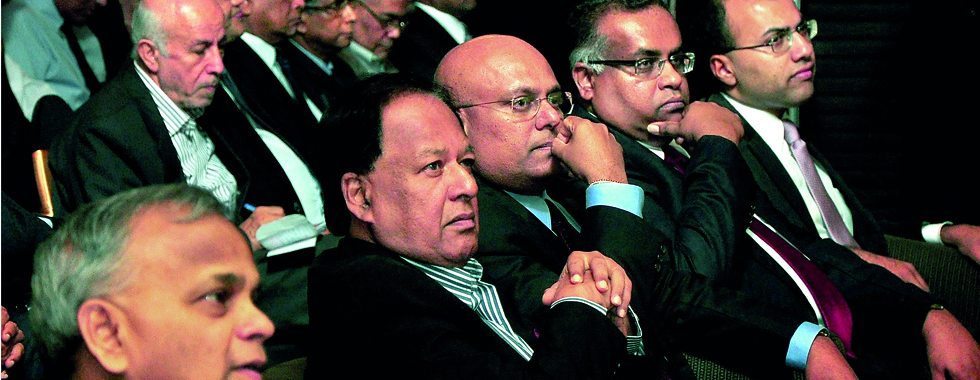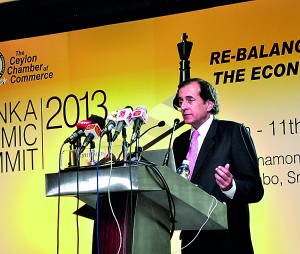Invest (in growth) without buying Lamborghinis : Amunugama
Sri Lanka’s private sector should invest (their money wisely). A senior government minister said.
“The good thing is that we are keeping money in the hands of the private sector with our very low tax regime,” Chief Guest of the 14th Sri Lanka Economic Summit, Senior Minister of International Monetary Co-operation and Deputy Minister of Finance Dr. Sarath Amunugama told Captains of industry at the inauguration this week.

Picture by Mangala Weerasekera shows from left – Hari Selvanathan, Chairman Carson Cumberbatch, Dr.Sarath Amunugama Senior Minister International Monetary Co-operation, Suresh Sha, Chairman Ceylon Chamber of Commerce (CCC), Samanthe Ranatunge, Deputy Chairman CCC and Koshy Mathai, Resident Representative, IMF Sri Lanka at the inauguration.
He added that maybe instead of buying Lamborghinis, they should invest the money in growth of Sri Lanka and be more active, eliciting laughter when he said that this is a very hard thing to say, especially when he had been the Chief Guest at the Lamborghini launch recently.
What’s wrong with China?
He said that Sri Lanka is one of the few countries in the world with free trade agreements with India, China and Pakistan. “If we play our cards right with China and India, we could get the figures that we want,” he said, stressing that Sri Lanka must look at a shift from advanced economies to China and India. “What is wrong with China buying everything we produce? These are different approaches we can consider. When we had the dip in garments, we faced lots of criticism but we would not have been eligible for GSP anyway because we moved to a middle income country status. We still have other options.”
Suresh Shah, Chairman Ceylon Chamber of Commerce said at the welcome address of the chamber-organised summit themed ‘Rebalancing the economy’ that in the last few years, the Sri Lankan economy has been growing at relatively fast pace, substantial investments have been made in infrastructure, tax reforms have been implemented and inflation has remained below double digits. “Then why re-balance because, we are some ways away from the targets that we – as a country – have committed to. And because, to bridge the gaps, we must commit ourselves to serious reforms.”
The most prominent amongst the targets is the rate of growth, he said, adding that the Government’s development plans speak of an 8 per cent – 8.5 per cent rate of growth in the short to medium term. “In 2010 the country achieved the 8 per cent rate for growth and surpassed it in 2011. All Sri Lankans were touched by the benefits of an economy on the move. However, in 2012, growth slowed. Economists called it ‘overheating’ giving the impression that time – to time brakes need to be applied to a fast moving economy, but must we stop an economy on the move? Can we not sustain the pace? Indeed, how do we sustain the pace? In a sense, this is the most pressing economic question we face.”
Export – centric nation
He stressed that Sri Lanka must become an export – centric nation. “We are too small a country to sustain growth by trading amongst ourselves. More importantly, we are an import dependent country; the stronger our growth, the greater the demand for imports, be it for consumption or production.” Further, he added that the government revenue is strongly linked to imports. “Therefore, we cannot afford to curtail imports but we will be forced to – as we were in 2012 – if our balance of payments gets out of sync, building a strong, sustainable, export centric economy will keep our trade balance and hence balance of payments, under control. Diversifying our basket of exports into value added goods and services and broadening our export markets – particularly into Asia – must from a central part of the strategy.”
Mr. Shah said that Sri Lanka FDI investments must reach approximately 35 per cent of GDP for growth to reach 8 per cent plus. As of now, there is a shortfall of approximately 5 per cent of GDP – or US$ 3 billion per annum – which must be sourced from overseas. In terms of global FDI flows this is not a large sum but certainly a quantum leap by Sri Lankan standards.” He said that to attract FDI, Sri Lanka does face some challenges, of which, one is the size of market the other is the less than complimentary press we receive in investor countries. “The former can be addressed via bilateral and where possible, multi-lateral trade agreements. In this context, we urge the Sri Lankan government to fast-track the Comprehensive Economic Partnership Agreement with India, subject of course, to the details to be negotiated.” India has acknowledged the need for an asymmetric agreement in favor of Sri Lanka. Mr. Shah said this must give comfort to local businesses that have genuine concerns of Indian products and services flooding local markets. “A second and again, valid concern is the possibility of the Sri Lankan economy becoming too dependent on India in the event of CEPA, but let’s address this challenge through a portfolio of trade agreements. For instance, could an agreement with ASEAN help balance the scales? Under the circumstances and also to minimise the unpleasant press – we must leverage our foreign policy as a strategic tool in our development process.”
He also stressed on managing expenditure. “Being an emerging economy we must increase investments in essentials such as education, health and in fracture. However, swift increases in revenue are hard to come by and in the short term, prioritising expenditure may deliver the best results. In this context, the productivity of state owned enterprises must be considered.” He said that last year loss making SOE’s made a combined loss of Rs. 191 billion. The recent increase in electricity tariffs which the Chamber accepts as necessary with the proviso that generating costs must be addressed he said will help to reduce these losses significantly. Nevertheless, stronger reforms are necessary to address the SOE’s; at the least, their management must be professionalised. At best, they must be privatized. A realistic solution probably lies somewhere in-between; possibly in listing commercially oriented SOE’s with the government retaining majority control.”
Red flag

Anoop Singh
He urged participants at the meeting to be conscious of a red flag on the horizon; the composition of debt. “Over the years, we have increased our exposure to commercial borrowings. This is not unexpected and indeed it is a challenge that we must face in our development process. However, we must never underestimate the ruthless nature of financial markets; they are professional and unforgiving, wonderful friends of a disciplined, well-managed economy but cool strangers at the first hint of trouble.”
He added that the progress is not as smooth because the many stakeholders of Sri Lanka don’t play together as one team. “We are hesitant to trust each other, we are not as open – minded as we should be and at times, self-centered rather than Sri Lanka – centered. This is counter – productive. If, however, we all work together as partners, our dream of a prosperous nation will be a reality.”
International Monetary Fund Bank Director – Asia and Pacific Department Anoop Singh delivering the keynote address said that Asia is currently growing at close to double of the global growth rate of 3 per cent, with emerging Asia, including Sri Lanka, growing close to 8 per cent and if it wasn’t for Asia, especially emerging Asia, global growth would be even lower than 3 per cent. He said that Asia’s share in the global economy has clearly been rising, with its share of world GDP, trade and finance increasing over the last 12 years. “This would improve even further over the next 10 years, with Asia holding half the share of global GDP and trade and trade integration within the region will also speed up within the same period of time.
Macro stability is critical
He added how Sri Lanka could grow at 8 per cent or higher over the next 10 to 15 years as predicted by the Government, Central Bank and other institutions.
“Productivity improvements have probably been the driver of sustained growth in growing countries in Asia. Macro stability is critical. If you don’t have this along with financial stability, you’re probably not going to be able to grow at 7 or 8 per cent for 25 years,” he said.
Sri Lanka has made progress with macro stability, improving greatly over the last three years with inflation coming down, he added, saying that Sri Lanka’s export sector, current account and reserves compared to the other ASEAN has done well in growth and brought inflation down. “The current account remains in deficit which makes Sri Lanka weaker and while reserves have improved, they are also weaker than other countries in ASEAN.
Sri Lanka also still has a fiscal deficit and in this regard, reforms have been undertaken in recent years and it will take some time to raise revenue,” he said, adding that revenue in Sri Lanka is still below where the ASEAN countries’ revenues are.
Financial stability is relatively good and Tier One capital for financial institutions in Sri Lanka have stayed relatively high although it is still less than the ASEAN countries. “In good news, non-performing loans have come down and therefore, on macro stability, from other experiences, inflation has to be stabilised at a low level and we need to have fiscal consolidation in a way that increases spending where there needs to be spending and the external sector needs to be strengthened further. Over the next 10 years financial deepening and financial integration is going to be very important for Asia and that is why financial stability is very important.”
| Parliamentarians agree to disagree on ‘rebalancing the economy’
The rule of law is imperative to hammer the Sri Lankan economy into shape, a set of politicos agreed at the final session on Thursday of the Ceylon Chamber of Commerce organised summit themed ‘Rebalancing the economy’. The economic peace dividend is substantial, Deputy Minister of Investment Promotion Faizer Mustapha said, starting the discussion. He added that the government has done substantial work in economic development and that this forum is discussing ‘rebalancing the economy’ because the government defeated terrorism. “If the war was still on, there would be no economy to rebalance,” he said. He said that there are certain issues, but at the people’s forum, and at successive elections, the government has been successful. He pointed out that with Sri Lanka reaching middle income country status it was no longer eligible for concessionary loans. UNP MP Dayasiri Jayasekera alleged that the country’s tourism sector is under threat as there’s no rule of law. Australia and New Zealand have issued travel warnings against Sri Lanka and has cautioned tourists against patronising local nightclubs. Deputy Speaker of Parliament Chandima Weerakody said that while there were allegations against increased state borrowings, it’s important to note that all these were utilised to develop the country’s infrastructure. Tamil National Alliance Parliamentarian M.A. Sumanthiran said good governance practices weren’t visible and it’s shown at the recent impeachment of the country’s Chief Justice. “If that kind of verdict can be given to someone of her calibre, what opportunities will ordinary investors have?” He added that despite the government ‘dishing out’ falling rates of unemployment, the state sector employment has risen. National List MP Harsha De Silva alleged that the state sector was growing at the expense of the private sector. He added that it’s an ‘accounting technique to rebalance an economy. “What must be rebalanced are the attitudes,” he said. |
Follow @timesonlinelk
comments powered by Disqus


